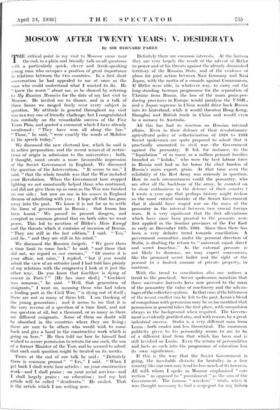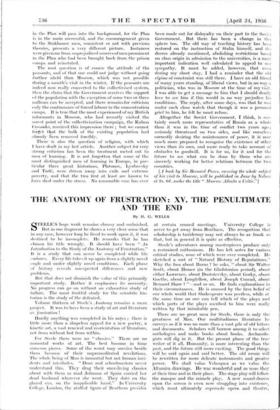MOSCOW AFTER TWENTY YEARS: V. DESIDERATA
By SIR BERNARD PARES
THE critical point in my visit to Moscow came near the end, in a plain and friendly talk on all questions with a particularly quick, clever and frank-speaking young man who occupies a position of great importance in relations between the two countries. In a first short conversation he had appealed to me at once as the man who could understand what I wanted to do. He "knew the worst" about me, as he showed by referring to My Russian Memoirs for the date of my last visit to Moscow. He invited me to dinner, and in a talk of three hours we ranged freely over every subject in question. my attitude in general throughout my visit was in a way one of friendly challenge, but I congratulated him cordially on the remarkable success of the Five Years Plan, and quoted a comment which I have already mentioned : "They have won all along the line." "Those," he said, "were exactly the words of Molotov in his speech today."
We discussed the new electoral law, which he said is in active preparation, and the recent removal of restric- tions of origin in admission to the universities ; both, I thought, must create a more favourable impression of the Soviet Government in England. We discussed the question of the Intervention. "It seems to me," I said, "that the whole trouble was that the War included your Revolution. When the Government here stopped fighting we not unnaturally helped those who continued, and did not give them up as soon as the War was finished on our side ; but now no one in his senses in England dreams of interfering with you ; I hope all that has gone away into the past. We know it is not for us to settle the form of government in Russia ; that lesson has been learnt." We passed to present dangers, and accepted as common ground that on both sides we want peace. This led to mention of Hitler's Mein Kampf and the threats which it contains of invasion of Russia. "They are still in the last edition," I said. "Yes," said he, "and they are still in his mind."
We discussed the Russian emigres. "We gave them a time limit to come back." he said, "and those that did not, we regard as our enemies." "Of course it is your affair, not mine," I replied, "but if you would admit the view of an outsider (and I had told him plainly of my relations with the emigrants) I look at it just the other way. Do you know that Guchkov is dying of cancer in Paris ? " [He has since died.] " Guchkov was someone," he said. "Well, that generation of emigrants," I went on, meaning those who had taken a leading part in the Civil War, "is dying out of itself; there are not so many of them left. I am thinking of the young generation ; and it seems to me that it is the very reverse of a question of a time limit, and not one question at all, but a thousand, or as many as there are different emigrants. Some of them no doubt will be absorbed in the countries where they are living ; there are sure to be others who would wish to come back and give a hand in the constructive work which is going on here." He then told me how he himself had wished to secure permission to return for one such, the son of a former Minister of the Tsar, and he seemed to admit that each such question might be treated on its merits.
Twice at the end of our talk he said : "Definitely there is common ground." "Yes," .1 said. "When I get back I shall write four articles : on your constructive work—and I shall praise ; on your social services—and I shall largely praise ; on education ; and my last article will be called "desiderata." He smiled. That is the article which I am writing now. Definitely there are common interests. At the bottom they are very largely the result of the advent of Hitler to power and of his threats against the already diminished territory of the Russian State, and of the evidence of plans for joint action between Nazi Germany and Nazi Japan, with the motto of a crusade against Communism. If Hitler were able, in whatever way, to carry out the long-standing German programme for the separation of Ukraine from Russia, the loss of the main grain-pro- ducing provinces in Europe would paralyse the USSR., and a Japan supreme in China would drive back Russia into its hinterland, while it would threaten Hong-Kong, Shanghai and British trade in China and would even be a menace to Australia.
All this has had its reaction on Russian internal affairs. Even in their defence of their revolutionary agricultural policy of collectivisation of 1928 to MS Soviet spokesmen are quite prepared to admit that it practically amounted to civil war—the Government against the peasantry. It led, for instance, to the " liquidation " of RS many as a million peasant families branded as " kulaks," who were the best labour force in Russia and had so far borne the chief burden of Russia's main export, grain. At that time even the reliability of the Red Army was seriously in question. How in such circumstances 'could the peasantry, who are after all the backbone of the army, be counted on to show enthusiasm in the defence of their country ? I wrote a year ago that perhaps history might reckon as the most critical mistake of the Soviet Government that it should have waged war on the mass of the peasantry in the interval between two crucial foreign wars. It is very significant that the first alleviations which have since been granted to the peasants were first applied in the frontier provinces of the Far East as early as December 11th, 1988. Since then there has been a very definite trend towards conciliation. A government committee, under the personal direction of Stalin, is drafting the return to "universal, equal, direct and secret franchise." As the external pressure is not likely to decrease, we may expect concessions, like the promised secret ballot and the right of the peasant to a limited amount of private property, to continue.
With the trend to conciliation also one notices a trend to the practical. Soviet spokesmen maintain that three successive harvests have now proved to the mass of the peasantry the value of machinery and the advan- tages of the collective system. In that case, if t hc bitterness of the recent conflict can be left to the past, Lenin's blend of compulsion with persuasion may be so far modified that persuasion in general takes the first place, with compulsion always in the background when required. The Govern- ment is evidently gratified also, and with reason, by a great industrial success. Stalin is a very different man from Lenin—both cruder and less theoretical. The enormous publicity given to his personality seems to me to be of a different kind from that which has been and is still lavished on Lenin. Even the return of personalities and facts as such into the programme of education has its own significance.
If this is the way that the Soviet Government is going, the inevitable distaste for brutality in a free country like our own may tend to lose much of its rawness. All with whom I spoke in Moscow emphasised " cor- rection " as opposed to " punishment " as the aim of the Government. The famous " wreckers' " trials, when it was thought necessary tu find a scapegoat for any failure in the Plan will pass into the background, for the Plan is in the main 'successful, and the encouragement given to the Stakhanov men, consistent or not with previous theories, presents a very different picture. Instances were given me from unprejudiced sources of men prominent in the Plan who had been brought back from the prison Vamps and reinstated.
, The root question is of course the attitude of the peasants, and of that one could not judge without going further afield than Moscow, which was not possible (luring a month's visit in the winter. If the peasants are indeed now really converted to the collectivised system, then the claim that the Government receives the support 44 the population with the exception of some two or three millions can be accepted, and there remains for criticism ally the continuance of forced labour in the concentration camps. It is time that the most experienced of my British informants in Moscow, who had recently visited the sorest point of the collectivisation campaign, the Kuban CossaekS, received this impression there ; but we cannot forget that the bulk of the existing population had already Acen removed forcibly.
There" is also the question of religion, with which I have dealt in my last article. Another subject for very strong criticism has been the treatment meted out to men of learning. It is not forgotten that some of the most distinguished men of learning in Europe, in par- t icular three great historians, Ilatonov, Lyubavsky and Tarle, were driven away into exile and extreme poverty, and that the two first at least are known to have died under the stress. No reasonable case has ever been made out for disloyalty on their part to the Soviet Government. But there has been a change in this sphere too. The old way of teaching history has beea restored on the instruction of Stalin himself, and the decree already mentioned, abolishing restrictions based on class origin in admission to the universities, is a most important indication well calculated to appeal to our sympathy. It must be added, however, that even during my short stay, I had a reminder that the old regime of constraint was still there. I have an old. friend of many years standing, of liberal views, but in no way a politician, who was in Moscow at the time of my visit. I was able to get a message to him that I should dearly love to see him if this would in no way prejudice his conditions. The reply, after some days, was that he was under such close watch that though it was a personal grief to him, he felt he must refuse.
Altogether the Soviet Government, I think, is cer- tainly much more representative of Russia as a whole than it was in the time of conflict two years ago ; seriously threatened on two sides, and like ourselves earnestly desiring the maintenance of peace, it now much more prepared to recognise the existence of other views than its own, and more ready to take account of obstacles to goodwill. It is for us, for it and for the future to see what can be done by those who are sincerely working for better relations between the two countries.
[A book by Sir Bernard Pares, covering the whole subject of his visit to Moscow, will be published in June by Nelson at 28. 6d. under the title "Moscow Admits a Critic."]



















































 Previous page
Previous page